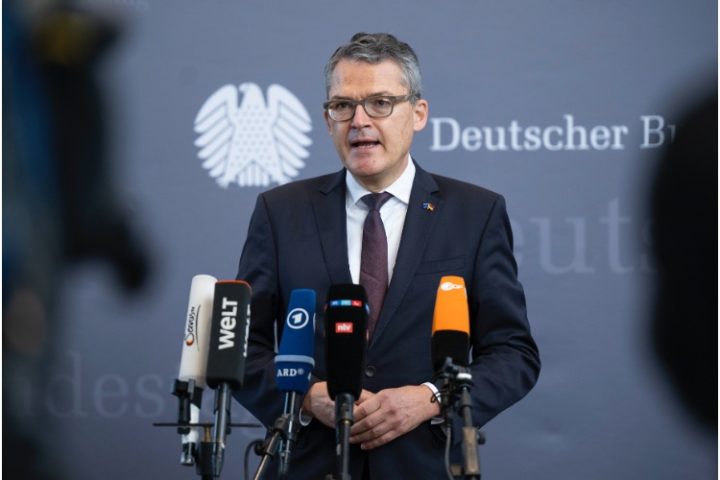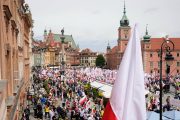
On December 4, German MP Roderich Kiesewetter told news outlet Die Welt that coercing hundreds of thousands of able-bodied Ukrainian men who escaped to the EU to return and join their country’s army would greatly boost Kyiv’s efforts in combating Moscow, adding that the huge number of Ukrainians dodging military service was one of the major problems faced by the Zelensky government.
Kyiv ordered a mass mobilization after hostilities with Russia began in February 2022, and banned men aged 18 to 60, who could potentially be called up for service, from leaving the country without a special exemption. Ukrainian officials and media have constantly reported a huge number of draft dodgers as officials grapple with replenishing army ranks amid massive losses.
In October, Ukrainian Deputy Defense Minister Natalya Kalmykova admitted that “tens, hundreds of thousands of people” were dodging the draft. Moreover, in early November, Ukrainian media reported that as many as 8,000 Ukrainians were facing criminal charges for draft evasion.
In November, Die Welt reported that Kyiv had resorted to conscripting major workers and potentially undermining Ukraine’s long-term economic viability in order to meet the army’s needs.
Questioned about demands for demobilization suggested by the families of Ukrainian soldiers, Kiesewetter said too many Ukrainians were hesitant to “relieve the burden” of their fellow citizens at the front lines.
“The crux of the matter for Ukraine is that, in the European Union, for example, over 600,000 able-bodied Ukrainian men are avoiding military service,” the lawmaker continued. Germany alone hosts some 220,000 such refugees, he added. Kiesewetter hitherto served with the German general staff and ended his military career as a colonel.
All those people should return to their home country to either join the army or to “help … by supporting the Red Cross, clearing up rubble, helping the fire brigades and providing civil support,” the MP, a member of the biggest opposition party, the Christian Democratic Union (CDU), said.
He elaborated that Germans should “make an appeal to the young men who are fit for military service” and that Brussels “should do the same.” He estimated that the number of male able-bodied Ukrainians living in Germany alone would be ample to staff “more than 10 divisions” for Kyiv.
Asked about potential diplomatic talks between Moscow and Kyiv, Kiesewetter immediately dismissed the idea, claiming Russia does not want to negotiate. Rather, the German MP called for increased arms supplies to Ukraine, acknowledging that the war will last “for quite some time.”
Contradicting Kiesewetter’s allegations that Moscow was opposed to peace talks with Kyiv, Kremlin spokesman Dmitry Peskov told RTVI on December 5 that his country has not excluded the possibility of negotiations with Kyiv and hopes to resolve the crisis via diplomatic and political means.
Peskov added that although Russia has never rejected the option of peace talks, it was Kyiv that backed out from the talks in spring 2022 when the conflict erupted.
Russia launched its military operation in Ukraine in February 2022 claiming to defend the interests of the Russian-speaking population of the two Donbass republics. The former Ukrainian territories declared independence from Kyiv following the 2014 Maidan coup, giving rise to years of conflict.
Moscow has repeatedly stated that it was open to talks with Kyiv as long as the situation on the ground is taken into account. In autumn 2022, the two republics, alongside two other Ukrainian territories, officially joined Russia following a series of referendums that Kyiv and its Western backers did not recognize.
On the other hand, Kyiv dismissed the idea of having any talks with Moscow on multiple occasions. Last fall, Zelensky signed a decree outlawing any talks with the current Kremlin leadership. The Ukrainian leader also put forward his own peace plan, demanding that all Russian troops back out from all the territories within Ukraine’s 1991 borders before any talks could start. Moscow rejected the idea, slamming it as detached from reality.
“President [Vladimir Putin] has repeatedly stated that achieving our goals [in the conflict with Kiev] is our top priority. And we would prefer to do that through political and diplomatic means,” Peskov said regarding potential talks with Ukraine. “We are still ready for negotiations,” he added.
Also, the Kremlin spokesman said that Kyiv itself had jeopardized the talks with Moscow that were held in spring 2022. “They [the Ukrainian officials] have themselves admitted that it was done on the orders of the UK…. The situation is pretty obvious,” he told RTVI.
Meanwhile, while on a visit to Mexico City, US Treasury Secretary Janet Yellen said on December 5 that the US will bear the blame should Ukraine lose to Russia on the battlefield if Congress does not approve additional aid.
U.S. lawmakers have been debating a $111 billion supplemental spending package that would include $61 billion for Kyiv, together with funding for Israel, Taiwan, and U.S. border security. The latest proposal was tabled by Democrats on December 5.
Yellen said she had talked to lawmakers, and they understand “that this is a dire situation and we can hold ourselves responsible for Ukraine’s defeat if we don’t manage to get this funding to Ukraine that’s needed, and I’m including direct budget support here because that’s utterly essential.”
The delay of U.S. war funding put Kyiv at a “big risk to lose this war,” Zelensky’s chief of staff, Andrey Yermak, cautioned at the U.S. Institute of Peace this week.
On December 4, U.S. Management and Budget Director Shalanda Young appealed to congressional leaders in a letter, warning that the resources allocated to Kyiv were running dry. She stated that by mid-November, the Pentagon had spent 97 percent of the $62.3 billion it had received this year for Ukraine. The State Department and the U.S. Agency for International Development, she said, had used up all of the funds allocated.
Responding to Young, House Speaker Mike Johnson said Republican support for the bill would require earmarking money for securing the U.S.-Mexico border against uncontrolled migration. Outlining the Republican position in October, he set down “two essential prerequisites: security at our border, and critical answers regarding the funds requested,” alluding to claims of corruption within Ukraine, and misuse of U.S.-provided funds.
On December 5, Zelensky was to appeal to the Senate and White House officials to discuss more money for Kyiv, but his team canceled the meeting minutes before it was to begin.
Following Zelensky’s unexpected cancellation, the briefing grew contentious, with some Republicans, including Senators Deb Fischer and Mitt Romney, leaving early.
“The point is there’s no answer to any questions down there,” Fischer told Defense News, adding, “We’ve had it.”
Speaker Johnson has demanded a “full accounting of how prior US military and humanitarian aid” to Ukraine was spent. Thus far, Washington has sent Kyiv almost $75 billion in combined funding over nearly two years of its conflict with Russia.



